英语专业实习手册范文篇
英语专业的实习报告5篇

英语专业的实习报告5篇英语专业的实习报告(篇1)这次的专业实习让我受益匪浅,收获颇多。
专业实习的主要目的是要培养我们理论联系实际,综合运用所学基础知识、基本理论和技能,独立分析、解决问题的能力。
在大学的第三学年,实习是一个很重要的环节,对我们以后的工作实习也有一定的帮助。
所以,我们要端正态度,认真对待这次的专业实习。
我们的主要任务是以英译汉为主,文章涉及经济,政治,人文,和生活等方面。
在翻译中遇到的许多问题与困难,说明在漫漫的英语学习过程中我还要继续努力。
学如逆水行舟,不进则退,只要每天我认真学习了,那就是一种进步。
人生总归会有许多挫折,但我们若不跨过这道坎,就不会有进步,滞留不前。
我们要用有限的生命创造无限的价值,勇敢面对每一个挑战。
英译汉,首先遇到的一个问题就是透彻地理解原文。
看一篇东西,可以有不同的目的。
若为获取信息,抓住大意就可以了。
若是为了消遣,那就可以看懂多少算多少。
若是为了翻译,那就非透彻理解原文不可。
有时似乎觉得懂了,但翻译起来还是不知如何下手,究其原因,可能仍是未能真正理解原文。
在这种情况下,若勉强去译,便会采取机械的办法,逐字翻译,许多错误的译法就是这样产生的。
就在第三周学校请来的李老师为我们所作的讲座中,他提到了关于business一词的不同用法,当出现在“Imean business”中,句子表示“我是认真的,”当出现在“business administration”中,这个词组表示“工商管理。
”这充分说明了一个词用在不同的场合会有不同的含义,我们不能只想到自己最熟悉的那个词的含义,而要充分利用上下文,依靠能够获得的相关信息,判断出词的确切含义。
若想避免这样的误译,可以倒回去,把译文和原文对照一下,看它是否和原文的意思相吻合。
在遇到习语时,更要勤查词典。
翻译是运用一种语言把另一种语言所表达的思维内容准确而完整地表达出来的语言行为。
当然纸上谈兵是无稽之谈,光有理论知识而不实践操作也是没有用的。
英语专业的实习报告范文(精选4篇)

英语专业的实习报告范文(精选4篇)英语专业的范文篇1学生毕业实习是商务英语专业教学计划的重要组成部分,是商务英语教学的一个重要环节,它对检查和提高教学质量,培养学生英语技能和商务知识在实际工作中的应用有着重要作用。
为将实习落到实处,提高实习质量,特制订本计划。
一、实习目的通过毕业实习和毕业报告的撰写,使学生把所学英语知识和商务基本理论、基本技能应用到实践中去,提高分析问题、解决问题的能力和创新能力,为今后从事涉外商务活动打下良好的基础。
二、实习内容1、熟悉实习单位的环境,了解实习单位各部门之间的工作程序和机制;2、根据所学专业,选择实习单位某一具体岗位,了解和参与该岗位的工作,熟悉工作流程、经营和管理;3、对毕业实习进行总结,完成毕业实习总结报告。
(实习总结文稿必须提交指导教师审核,实习总结报告定稿完成后按学院要求格式打印,将纸质及电子文稿6月12日前交指导教师。
);4、实习岗位要求专业对口。
三、实习方式及时间(一)实习方式:学院推荐或学生自主选择的实习单位;(二)实习时间:xx年3月1日5月31日期间:1、4月1日5月1日学生根据实习单位特点选定总结报告方向及题目2、5月2日5月31日撰写实习总结报告并与指导老师沟通,指导老师提出修改意见,学生做好修改3、6月1日6月3日学生返校将实习总结报告按统一格式打印两份交纸质和电子文稿给指导老师,指导老师做好成绩评定工作4、6月25日前外语系上交实习总结报告给教务处四、毕业实习成绩考核(一)考核内容1、实习态度与表现,完成实习任务的情况;2、独立工作能力和实际操作能力;3、实习单位对实习学生的.鉴定;4、实习报告。
将自己的实习成果在实习报告中反映出来,要求文字通顺,内容全面。
字数4000字左右。
主要内容包括:实习的概况,实习过程的主要环节、事件,实习的收获与体会以及对本专业教学的意见和建议。
(二)成绩评定成绩评定标准采用五级制:优秀、良好、中等、及格和不及格。
英语专业毕业实习报告范文5篇
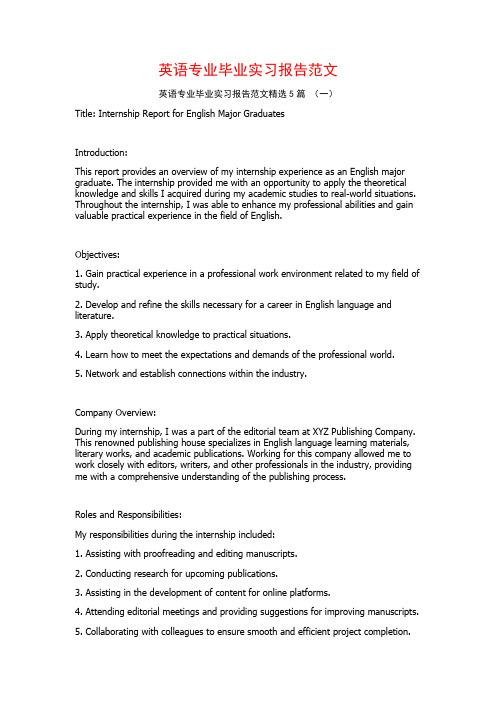
英语专业毕业实习报告范文英语专业毕业实习报告范文精选5篇(一)Title: Internship Report for English Major GraduatesIntroduction:This report provides an overview of my internship experience as an English major graduate. The internship provided me with an opportunity to apply the theoretical knowledge and skills I acquired during my academic studies to real-world situations. Throughout the internship, I was able to enhance my professional abilities and gain valuable practical experience in the field of English.Objectives:1. Gain practical experience in a professional work environment related to my field of study.2. Develop and refine the skills necessary for a career in English language and literature.3. Apply theoretical knowledge to practical situations.4. Learn how to meet the expectations and demands of the professional world.5. Network and establish connections within the industry.Company Overview:During my internship, I was a part of the editorial team at XYZ Publishing Company. This renowned publishing house specializes in English language learning materials, literary works, and academic publications. Working for this company allowed me to work closely with editors, writers, and other professionals in the industry, providing me with a comprehensive understanding of the publishing process.Roles and Responsibilities:My responsibilities during the internship included:1. Assisting with proofreading and editing manuscripts.2. Conducting research for upcoming publications.3. Assisting in the development of content for online platforms.4. Attending editorial meetings and providing suggestions for improving manuscripts.5. Collaborating with colleagues to ensure smooth and efficient project completion.Skills and Knowledge Gained:Throughout the internship, I gained valuable skills and knowledge, including:1. Enhanced written and verbal communication skills.2. Improved editing and proofreading abilities.3. Developed research skills, including the ability to gather and analyze relevant information.4. Gained knowledge of the publishing industry, including the editorial and production processes.5. Learned to work effectively in a team and meet deadlines.Challenges and Lessons Learned:1. Adapting to the fast-paced nature of the professional work environment.2. Balancing multiple tasks and priorities.3. Handling constructive criticism and incorporating feedback into my work.4. Learning to navigate and utilize new software and tools.5. Developing effective communication and collaboration skills.Conclusion:Overall, my internship experience as an English major graduate provided me with a solid foundation for my future career. It gave me insight into the professional world and allowed me to refine my skills in a practical setting. I am confident that the skills, knowledge, and connections gained during the internship will greatly benefit my future endeavors in the field of English language and literature.英语专业毕业实习报告范文精选5篇(二)Internship ReportName: [Your Name]Major: English Language and LiteratureUniversity: [University Name]Duration: [Start Date – End Date]1. IntroductionThe purpose of this report is to provide an overview of my internship experience as an English Language and Literature major. The internship was a requirement for my degree program, providing me with practical experience in the field. Throughout the duration of the internship, I worked at [Company/Organization Name], where I was able to apply and further develop my knowledge and skills in various areas of the profession.2. ObjectivesThe specific objectives of the internship were as follows:- Gain practical experience in applying theories and concepts learned during my studies- Develop and strengthen my written and verbal communication skills- Learn about the functions and responsibilities of professionals in the field- Acquire knowledge about the industry and professional work environment3. Job DescriptionDuring my internship, I was assigned to the [Department/Team Name] at [Company/Organization Name]. My primary responsibilities included:- Assisting in the development of English language training materials and resources - Conducting research on various topics related to language and literature- Proofreading and editing written content for accuracy and clarity- Assisting with administrative tasks, such as organizing files and scheduling meetings4. Learning OutcomesThroughout the internship, I was able to achieve the following learning outcomes: - Developed a deeper understanding of English language and literature through practical application- Improved my communication skills through regular interaction with colleagues- Enhanced my research skills by conducting in-depth studies on various subjects- Gained hands-on experience in proofreading and editing written content- Learned how to effectively manage time and prioritize tasks in a professional work environment5. Lessons LearnedDuring my internship, I encountered various challenges and learned important lessons that will benefit my future career. Some of the key lessons I learned include: - The importance of attention to detail in tasks such as proofreading and editing- The value of effective communication and teamwork in achieving common goals - The significance of time management and organization in meeting deadlines- The need to be adaptable and flexible in a dynamic work environment6. ConclusionOverall, my internship experience as an English Language and Literature major has been invaluable in terms of gaining practical experience and professional skills. I am confident that the knowledge and skills I have acquired during this internship will greatly contribute to my future career in the field. I am grateful for the opportunity to intern at [Company/Organization Name] and I extend my sincere appreciation to the faculty and staff of [University Name] for their support throughout the process.英语专业毕业实习报告范文精选5篇(三)下面是一个英语专业毕业生实习报告的格式示例:实习报告封面- 标题:实习报告- 实习单位:XXX公司- 实习时间:20XX年XX月-20XX年XX月- 学生姓名:XXX- 专业:英语- 学号:XXXXXXX实习报告目录一、实习单位概况1. 实习单位介绍2. 实习岗位职责二、实习工作总结1. 实习岗位的主要工作内容2. 实习期间的工作经验与收获三、实习心得体会1. 对职业发展的影响2. 对专业知识和技能的应用3. 对自己职业规划的思考四、实习问题与建议1. 实习中遇到的问题2. 实习中对实习单位的建议一、实习单位概况1. 实习单位介绍- 公司名称、规模、性质等基本信息- 公司主要业务领域和产品- 公司的组织结构和人员分布情况2. 实习岗位职责- 实习期间承担的具体工作内容- 实习岗位的职责和要求二、实习工作总结1. 实习岗位的主要工作内容- 详细描述实习期间承担的工作任务和具体操作步骤- 关键工作成果和取得的成绩2. 实习期间的工作经验与收获- 在实习岗位上遇到的挑战和困难,以及解决的方法- 在团队合作中的角色和贡献- 实习期间学到的专业知识和技能三、实习心得体会1. 对职业发展的影响- 实习经历对个人职业规划和发展的影响- 对自己未来职业发展道路的认识和规划2. 对专业知识和技能的应用- 实习中所学到的专业知识和技能在实际工作中的应用情况- 发现的不足和需要进一步提升的技能3. 对自己职业规划的思考- 实习经历对自己职业规划的启示和思考- 探索未来职业发展的方向和目标四、实习问题与建议1. 实习中遇到的问题- 实习期间所碰到的问题和困难- 解决问题的措施和方法2. 实习中对实习单位的建议- 对实习单位现有工作流程和管理方式的建议和改进意见- 对实习单位培养人才的建议参考文献(如果有)英语专业毕业实习报告范文精选5篇(四)以下是一份英语专业毕业生实习报告的范文,供您参考:实习报告实习单位:XXX公司实习时间:20XX年X月至20XX年X月实习岗位:市场部助理一、实习目标与任务作为一名英语专业的毕业生,在实习期间,我主要的目标是深入了解市场部的运作和市场营销的基本理论,提升自己的实践能力,并通过实际操作获得对市场工作的全面了解。
英语专业毕业实习报告范文(三篇)
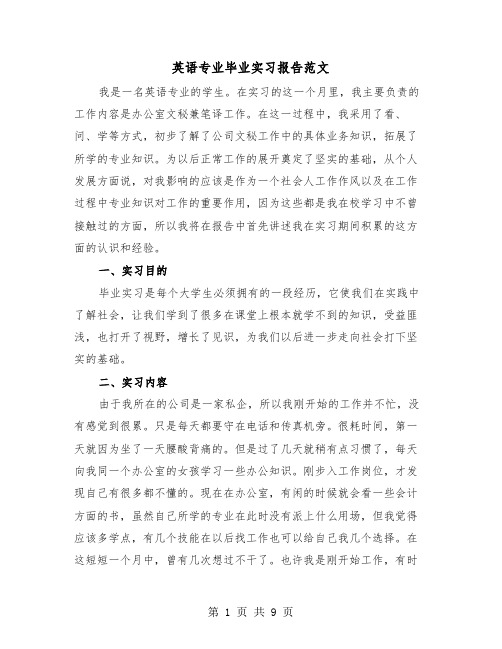
英语专业毕业实习报告范文我是一名英语专业的学生。
在实习的这一个月里,我主要负责的工作内容是办公室文秘兼笔译工作。
在这一过程中,我采用了看、问、学等方式,初步了解了公司文秘工作中的具体业务知识,拓展了所学的专业知识。
为以后正常工作的展开奠定了坚实的基础,从个人发展方面说,对我影响的应该是作为一个社会人工作作风以及在工作过程中专业知识对工作的重要作用,因为这些都是我在校学习中不曾接触过的方面,所以我将在报告中首先讲述我在实习期间积累的这方面的认识和经验。
一、实习目的毕业实习是每个大学生必须拥有的一段经历,它使我们在实践中了解社会,让我们学到了很多在课堂上根本就学不到的知识,受益匪浅,也打开了视野,增长了见识,为我们以后进一步走向社会打下坚实的基础。
二、实习内容由于我所在的公司是一家私企,所以我刚开始的工作并不忙,没有感觉到很累。
只是每天都要守在电话和传真机旁。
很耗时间,第一天就因为坐了一天腰酸背痛的。
但是过了几天就稍有点习惯了,每天向我同一个办公室的女孩学习一些办公知识。
刚步入工作岗位,才发现自己有很多都不懂的。
现在在办公室,有闲的时候就会看一些会计方面的书,虽然自己所学的专业在此时没有派上什么用场,但我觉得应该多学点,有几个技能在以后找工作也可以给自己我几个选择。
在这短短一个月中,曾有几次想过不干了。
也许我是刚开始工作,有时受不了经理给的“气”,自己心里很不舒服,就想辞职再重新换个工作得了。
但静下心来仔细想想,再换个工作也是的,在别人手底下工作不都是这样么?刚开始就应该踏踏实实的干好自己的工作,毕竟又没有工作经验,现在有机会了就要从各方面锻炼自己。
不然,想念以后干什么都会干不好的。
我现在的工作,相比其他人来说待遇挺不错的了,也不是和其他人比,工作也不是很难,很容易进入工作,关键是学习对人怎么说话、态度及其处事。
由于经验少,我现在这方面还有欠缺。
现在才明白,在校做一名学生,是多么的好啊!早晚要工作,早晚要步入社会,早晚要面对这些避免不了的事。
英语专业实习报告范文(8篇)
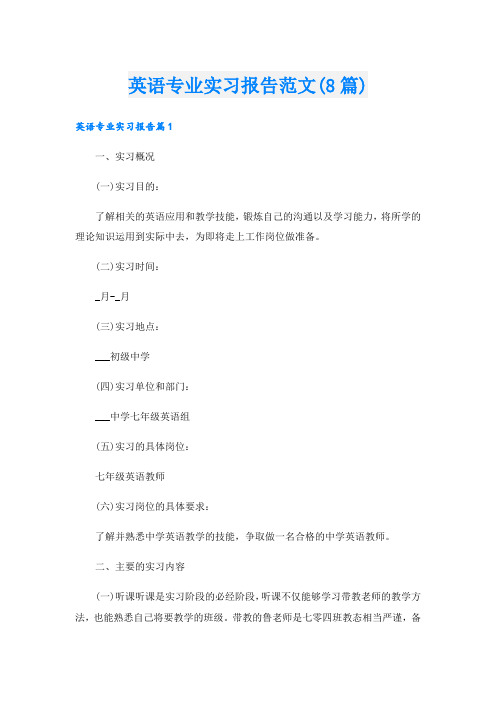
英语专业实习报告范文(8篇)英语专业实习报告篇1一、实习概况(一)实习目的:了解相关的英语应用和教学技能,锻炼自己的沟通以及学习能力,将所学的理论知识运用到实际中去,为即将走上工作岗位做准备。
(二)实习时间:_月-_月(三)实习地点:___初级中学(四)实习单位和部门:___中学七年级英语组(五)实习的具体岗位:七年级英语教师(六)实习岗位的具体要求:了解并熟悉中学英语教学的技能,争取做一名合格的中学英语教师。
二、主要的实习内容(一)听课听课是实习阶段的必经阶段,听课不仅能够学习带教老师的教学方法,也能熟悉自己将要教学的班级。
带教的鲁老师是七零四班教态相当严谨,备课很充分。
充分的备课是上好一堂课的充分条件,因此在上课前,要做好充分的备课准备。
带教的鲁老师每次上课前都会复习上几节课所学习的主要句型,通过老师和学生对话的形式来呈现所学过的主要句型。
对于学生的回答,老师给予的鼓励也有很多种,比如:“You’ve done a goood jod!”“ You are great!”“E_cellent!”“Very goood!”并且,我注意到学生与老师间的基本尊重也是非常重要的,光是“Thank you !Sit down,please、”这句话,老师在每一节课都要说好多遍。
因此说,教学内容固然重要,学生与老师间的基本尊重也是我们需要注意的地方。
(二)试教我第一次站到讲台上,心中充满了紧张与恐惧,怀着忐忑不安的心站在讲台上。
虽然也做了充分的准备,但第一次面对那么大一班学生,仍是底气不足。
课上会出现一些诸如“讲课重点不突出”,“讲课顺序不清”,“师生配合不够默契”和“板书条理性不强”等问题。
针对出现这些问题的学生,指导教师要求自己多听课,多向带课教师学习,并且面对面地指出教案的不足之处,帮助修改教案、纠正学生不正确的语音、语调、节奏感、选择有说服力的例句解释各个知识点。
随着讲课次数的增多,我站在讲台上也不再那么胆怯了,说话的底气也足了,也开始喜欢站在讲台上授课的感觉。
英文实习报告范文3篇

英文实习报告范文英文实习报告范文精选3篇(一)Internship ReportDuring my internship at XYZ Company, I had the opportunity to work in the marketing department for a period of three months. This experience has been both challenging and rewarding, allowing me to apply the knowledge I learned in schoolto real-life situations.As an intern, my main tasks were to assist the marketing team in their daily activities. This included conducting market research, analyzing competitors, and creating marketing materials. I also had the chance to attend meetings and brainstorming sessions, where I was able to contribute my ideas and learn from my colleagues.One of the highlights of my internship was working on a new product launch. I was responsible for conducting market research to identify potential target audiences and develop marketing strategies to reach them. This involved analyzing consumer behavior, studying market trends, and conducting surveys. Through this project, I learned the importance of understanding your target audience and tailoring your marketing efforts accordingly.In addition to my daily tasks, I also had the opportunity to attend training sessions and workshops organized by the company. These sessions covered a range of topics, including digital marketing, social media management, and advertising techniques. These trainings not only enhanced my knowledge and skills but also provided me with valuable insights into the industry.Overall, my internship at XYZ Company has been a valuable experience. It has allowed me to apply my theoretical knowledge to practical situations and gain a better understanding of the marketing industry. I am grateful for the opportunities I had and the support I received from my colleagues. I am confident that the skills and experiences gained during this internship will be valuable in my future career endeavors.英文实习报告范文精选3篇(二)Internship ReportName: [Your Name]Semester: [Semester]Introduction:I recently completed an internship at [Company Name] as a [Position]. This internship was a valuable opportunity for me to apply and enhance my skills in [field], as well as gain practical experience in a professional work environment. In this report, I will provide an overview of my internship experience, including the projects I worked on, the skills I developed, and the challenges I encountered.Description of Projects:During my internship, I had the opportunity to work on several projects that contributed to the overall success of the company. One of the main projects I was involved in was [Project Name]. This project required me to [describe your roles and responsibilities in the project]. Through this project, I was able to develop my skillsin [specific skills relevant to the project] and gained a deeper understanding of [specific knowledge related to the project].In addition to [Project Name], I also had the chance to assist in other projects such as [Project 2] and [Project 3]. These projects allowed me to collaborate with different teams and learn about various aspects of the company's operations. By actively participating in these projects, I was able to acquire new skills and broaden my knowledge in [specific areas].Skills Developed:Throughout my internship, I had the opportunity to develop and strengthen several key skills. Firstly, I significantly improved my communication skills by interacting with colleagues and clients on a daily basis. This experience taught me how to effectively convey ideas and present information in a professional manner.Secondly, my problem-solving skills were greatly enhanced as I encountered various challenges during the course of my internship. It allowed me to think critically and develop innovative solutions to overcome these obstacles.Furthermore, my project management skills also saw remarkable improvement as I was responsible for managing and coordinating tasks within the team. This taught me the importance of organization, time management, and prioritization.Challenges Faced:During my internship, I encountered several challenges that tested my abilities and pushed me to grow. One of the major challenges I faced was [describe thechallenge]. However, through perseverance and the support of my colleagues, I was able to overcome this challenge and complete the project successfully. This experience taught me the importance of adaptability and resilience in a professional setting.Conclusion:In conclusion, my internship at [Company Name] was an enriching experience that allowed me to apply my knowledge and develop new skills. Through various projects and challenges, I gained valuable insights into the field of [field] and honed my professional abilities. I am grateful for this opportunity and believe that the skills and experience gained during my internship will greatly benefit my future career.英文实习报告范文精选3篇(三)Internship ReportIntroductionDuring my internship at XYZ Company, I had the opportunity to work in the marketing department for a period of three months. This report aims to provide a comprehensive overview of my experience, the tasks I performed, and the skills I have gained during this internship.Company BackgroundXYZ Company is a multinational corporation in the consumer goods industry. It is known for its innovative and high-quality products in the market. The marketing department of the company is responsible for creating brand awareness, developing marketing strategies, and executing various promotional activities.Internship ObjectivesThe main objectives of my internship were to gain practical experience in marketing, enhance my knowledge of market research and analysis, and learn how to develop effective marketing strategies. Additionally, I also aimed to improve my communication and teamwork skills by collaborating with colleagues in various marketing projects.Internship Activities and AchievementsThroughout my internship, I had the opportunity to engage in a wide range of activities and projects. Some of the major tasks I undertook include:1. Market research: I conducted extensive market research to identify consumer preferences, market trends, and competitor analysis. This involved analyzing sales data, surveying customers, and researching industry reports.2. Social media management: I assisted in managing the company's social media accounts, creating content, and monitoring engagement. This involved creating monthly content calendars, scheduling posts, and analyzing the impact of social media campaigns.3. Marketing campaign development: I actively participated in developing marketing campaigns for new product launches. This involved brainstorming ideas, creating promotional materials, and collaborating with cross-functional teams.4. Trade show participation: I had the opportunity to represent the company at industry trade shows and exhibitions. This involved setting up booths, interacting with potential customers, and promoting our products.5. Data analysis: I used various software tools to analyze marketing data, such as sales figures, customer feedback, and website analytics. This helped identify trends and patterns, which were used to inform marketing strategies.Key LearningsDuring my internship, I gained valuable insights and learned several important lessons. Some of the key learnings include:1. The importance of thorough market research: Conducting in-depth market research is crucial for understanding customer needs, identifying market trends, and making informed business decisions.2. Effective communication skills: Clear and concise communication is essential when working in a team, as it facilitates collaboration and ensures tasks are completed efficiently.3. Adaptability: The marketing landscape is constantly changing, and it is important to be adaptable and open to new ideas and strategies.4. Analytical skills: Analyzing data and interpreting insights is a vital skill in marketing. It helps in identifying areas for improvement, measuring the effectiveness of campaigns, and making data-driven decisions.ConclusionOverall, my internship at XYZ Company has been a valuable experience that has provided me with practical knowledge and skills in the field of marketing. I have learned how to conduct market research, develop marketing strategies, and analyze data. Additionally, I have also improved my communication and teamwork skills. I am grateful to the company for giving me this opportunity and would highly recommend the internship program to other students.。
英语专业实习报告(精选27篇)
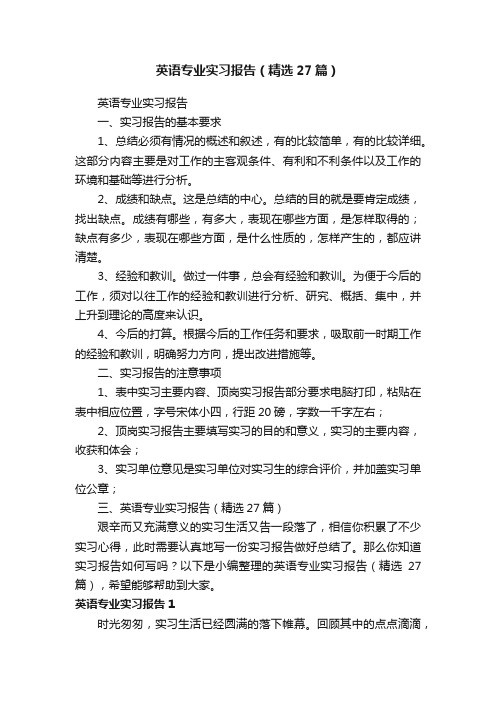
英语专业实习报告(精选27篇)英语专业实习报告一、实习报告的基本要求1、总结必须有情况的概述和叙述,有的比较简单,有的比较详细。
这部分内容主要是对工作的主客观条件、有利和不利条件以及工作的环境和基础等进行分析。
2、成绩和缺点。
这是总结的中心。
总结的目的就是要肯定成绩,找出缺点。
成绩有哪些,有多大,表现在哪些方面,是怎样取得的;缺点有多少,表现在哪些方面,是什么性质的,怎样产生的,都应讲清楚。
3、经验和教训。
做过一件事,总会有经验和教训。
为便于今后的工作,须对以往工作的经验和教训进行分析、研究、概括、集中,并上升到理论的高度来认识。
4、今后的打算。
根据今后的工作任务和要求,吸取前一时期工作的经验和教训,明确努力方向,提出改进措施等。
二、实习报告的注意事项1、表中实习主要内容、顶岗实习报告部分要求电脑打印,粘贴在表中相应位置,字号宋体小四,行距20磅,字数一千字左右;2、顶岗实习报告主要填写实习的目的和意义,实习的主要内容,收获和体会;3、实习单位意见是实习单位对实习生的综合评价,并加盖实习单位公章;三、英语专业实习报告(精选27篇)艰辛而又充满意义的实习生活又告一段落了,相信你积累了不少实习心得,此时需要认真地写一份实习报告做好总结了。
那么你知道实习报告如何写吗?以下是小编整理的英语专业实习报告(精选27篇),希望能够帮助到大家。
英语专业实习报告1时光匆匆,实习生活已经圆满的落下帷幕。
回顾其中的点点滴滴,有成功后的欣喜和激动,也有挫败后的失落和无奈。
在领导的谆谆教导和同事的悉心帮助下,我在收获业务技能的同时,内心也经历着微妙的成长。
一、实习岗位这次实习我主要负责的是翻译工作。
第一次走进办公室,一切都是那么陌生,所有的工作人员都各自忙着,仿佛没有人注意到我,这让我本来激动的心情多了一些慌乱。
在这里我要特别感谢主任,是他把我介绍给其它的同事认识,还告诉其他同事要在工作上对我多提醒照顾。
慢慢的我也不在只是闷着头做,遇到疑难的问题就请教领导与同事,我觉得自己开始融入这个集体了。
英语专业实习报告范文3000字(13篇)

英语专业实习报告范文3000字(13篇)英语专业实习报告篇1转眼间,两个月的实习就要结束了。
回顾这两个月的实习,感触颇深,收获颇丰。
在过去的两个月里,在领导和同事的悉心关怀和指导下,我通过自己的不懈努力,学到了难得的工作经验和社会知识。
我将从以下几个方面总结自己在英语教育实习期间的经历和体会:一、努力学习,理论结合实践,不断提高自身工作能力。
在英语教育实习期间,我始终把学习作为获取新知识、掌握方法、提高能力、解决问题的重要途径和方法,以理论武装头脑、指导实践、促进工作。
只有积极主动地思考,在社会实践中积极运用自己已有的知识,才能在实践中检验知识的有用性。
在两个月的实习中,我最大的感受是,我们在学校学到了很多理论知识,却很少用到社会实践中,以至于理论和实践大大脱节,以至于在以后的学习和生活中找不到方向,学以致用。
同时,在工作中不断学习也是弥补自身不足的有效方法。
信息时代,社会在变,人也在变,一天不学习就会落后。
通过两个月的实习,结合英语教育岗位工作的实际情况,认真学习了英语教育岗位工作的各项政策、管理制度和工作规定,使工作中的困难得到了最有效的解决。
通过对这些工作规定的学习,我进一步加深了对各项工作的理解,能够务实地开展各项工作。
第二,突出工作重点,突出重点,尽职尽责。
我以认真负责的态度对待英语教育的每一份工作。
虽然一开始觉得自己在英语教育中因为经验和认识的不足,找不到事情做,得不到锻炼的目的,但很快就从自己做起,找出原因,和同事沟通,认识到自己的不足,让自己很快转变了角色和工作定位。
为了让自己尽快熟悉工作,进入角色,我一方面抓紧时间查阅相关资料,熟悉自己的工作职责,另一方面虚心向领导和同事请教,让他们对英语教育岗位的工作有一个比较系统全面的了解。
根据英语教育岗位工作的实际情况,结合自身优势,把握工作的重点和难点,尽最大努力完成英语教育岗位工作任务。
在两个月的实习中,我经常受到同事的表扬和领导的表扬。
英语专业实习报告范文(5篇)

英语专业实习报告范文一、实习岗位我被分配在翻译协会里任职,所以我们就在学校里拿到了老师发给我们的翻译材料。
我们的实习内容是翻译一书中的几个章节,而我的任务是翻译此书的第一章的第一篇文章,大约5000字左右的文字。
二、实习内容记得那天去领取翻译任务时,指导老师拿出一本厚厚的书对我们说翻译材料就是这本书中的几个章节,每个人要翻译大概十五页。
我当时心想这么厚重又是纯英文的原著要是让我们翻译起来肯定很费力。
其他几个同学也表现出几分忧虑的形色。
老师自然是看出了我们的焦虑,语重心长地对我们说道这本关于文化概念的原著翻译起来是有点费劲,其中不乏晦涩难懂的单词、长句甚至段落。
但是大家要记住首先要摆正好心态,不能因为一件事很难就不去做或者马马虎虎地了事,要做就要努力做到最好,翻译也是一样。
其次,这本书的每个章节前会有一篇关于那章的中文概述,可以供大家大概地了解一下要翻译的作品的基本内容。
然后的话,就是针对翻译过程中可能遇到的困难大家该如何处理的问题。
这个解决方法有很多种,但是老师建议大家可以把自己要翻译的部分拿出来和其他人一起探讨,交流,通过这种讨论的方式,我相信大家从中会学到很多东西。
另外,遇上不懂的也可以到老师这里来,老师几乎每天都在办公室里,随时欢迎大家的到来。
”老师的这段话可以说给我们每个人都打上了一针镇定剂埃回到寝室后,我迫不及待地浏览了一下我的翻译材料,看到密密麻麻的英文单词,还是有种望而生畏的感觉。
在接下来的时间里,我首先是把要翻译的十五页从头到尾一共看了三遍,这才勉强了解了英文原著的大概内容,但总有些似懂非懂模模糊糊的概念萦绕在脑海里。
而后,我就从头开始投入了我的翻译工作中。
先是把不认识的单词全都挑出来,查清楚他们的含义,然后再根据上下文推断出生词的准确含义,就这样先查单词再推断其在文中准确的含义最后翻译句子,绕来绕去,仅仅翻译第一段就花费了我一个上午的时间,要知道第一段可是只有七八个句子而已。
所以不得不感慨自己的速度比蜗牛还慢呀。
英语专业实习报告范本(5篇)
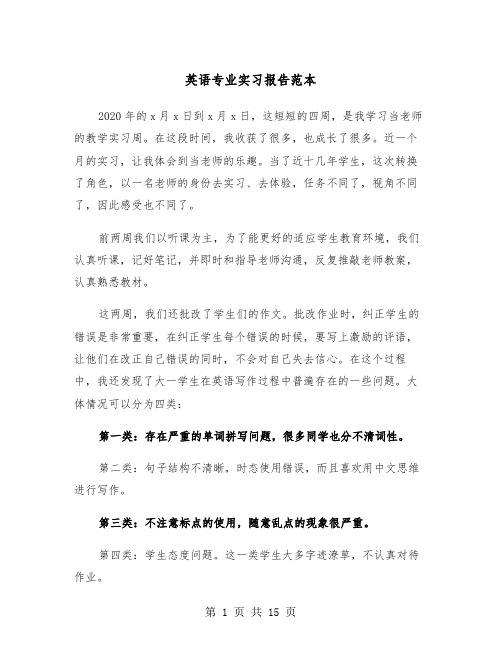
英语专业实习报告范本2020年的x月x日到x月x日,这短短的四周,是我学习当老师的教学实习周。
在这段时间,我收获了很多,也成长了很多。
近一个月的实习,让我体会到当老师的乐趣。
当了近十几年学生,这次转换了角色,以一名老师的身份去实习、去体验,任务不同了,视角不同了,因此感受也不同了。
前两周我们以听课为主,为了能更好的适应学生教育环境,我们认真听课,记好笔记,并即时和指导老师沟通,反复推敲老师教案,认真熟悉教材。
这两周,我们还批改了学生们的作文。
批改作业时,纠正学生的错误是非常重要,在纠正学生每个错误的时候,要写上激励的评语,让他们在改正自己错误的同时,不会对自己失去信心。
在这个过程中,我还发现了大一学生在英语写作过程中普遍存在的一些问题。
大体情况可以分为四类:第一类:存在严重的单词拼写问题,很多同学也分不清词性。
第二类:句子结构不清晰,时态使用错误,而且喜欢用中文思维进行写作。
第三类:不注意标点的使用,随意乱点的现象很严重。
第四类:学生态度问题。
这一类学生大多字迹潦草,不认真对待作业。
经过两周的听课,第三周,我们便开始准备教案,为讲课作准备。
指导老师指导我们写教案,给我们建议。
第四周的周一早上,我们进行了次试讲。
虽然试讲并不正式,可是讲课的过程中依然会暴露很多缺点。
结束之后,x老师说我的构思很好,同时也给我提了很多宝贵的建议。
我认真听着,积极总结,并及时予以修改。
周二晚上,x老师又抽出宝贵的时间,听我们又试讲了一次。
这一次,老师又给我们提了意见,并让我周三正式上讲台。
于是,x月x日,周三下午,我正式登上了讲台。
上课前我感到非常紧张,紧张的介绍完自己,深呼吸了好几次,终于调整好了自己的情绪,开始讲起课来。
我按照我的计划逐步进行着内容,同学们也很配合,他们的积极参与让课堂十分有趣。
我便充分放松了自己,大胆的讲起课来。
最后,由于时间没有把握好,准备的内容并没有讲完。
课后,x老师评价说我讲的挺好,我的搭档也说挺好。
英语专业实习报告范本(6篇)

英语专业实习报告范本一、实习目的到所学专业所应用的相关单位如外资企业、翻译公司、旅行社等部门对所学专业应用范围有一个初步了解从而明确学习目的、方向。
二、实习时间xx年x月x日-x月x日三、报告内容今年寒假我有幸到我们市一中实习,也就是我的高中,我的母校。
虽然这个假期没有好好的休息,但是就业的压力使我知道这个寒假也是一个很好的接触社会,检验自己所学知识的机会。
通过这7天的实习,我深深体会到了将理论与实践结合起来的不易,也通过这7天的努力,使我熟悉了从事教师行业的不易,这7天的代班老师工作,为我今后真正踏入工作岗位积累了一定的实践经验。
对于自己的母校可以说是再熟悉不过。
来自己的母校实习,也是别有一番意义的。
回学校实习,亲切万分,亲爱的老师们还在,接受教育的学生们却是一张张全新的面孔,想想自己离开学校2年来的进进出出,看到学校的操场,体育馆甚至教室,过去的记忆就不断在脑海里回旋。
第一天的时候,我跟着班主任李老师熟悉了一下学校目前的情况,以及实习期间需要注意的一些事项。
我们原来的英语老师王老师,教学经验十分丰富,目前担任高二组的组长,因为她是我原来的老师,所以我有幸在她所带的班级实习,王老师向我简单介绍了一下所带班级的基本情况。
第二天正式到班级,当时想到就要面对60多个学生,不免还是有点担心和紧张。
听课实习的必经阶段,听课不仅能够学习拥有教学经验的老师的教学方法,也能熟悉如果以后能的成为英语教师所要面对的情况。
高中阶段的英语课程与大学里大不相同,现在的课本经过了改革,所以现在的教学要求也有新的变化,教学方法上有很大差异。
王老师教学状态相当严谨,备课很充分,又开始听她讲课,很有亲切感,再次听她的课就觉得整节课规划的很好,让学生知道这节课要完成的内容,就算有突发状况的发生,也能自行控制好时间等等。
我听了整整一个章节课的完整过程,每个部分都有不同的上课形式,都是值得学习的地方。
因为我不是学师范专业的学生,所以并不是很懂得英语教学法,真正坐在教室后面听课的感觉很不一样,教学的内容就算一样,方式也有很多种,可以老师自己授课,可以让学生回答问题,可以结合练习加深印象。
英语专业实习报告范文精选10篇
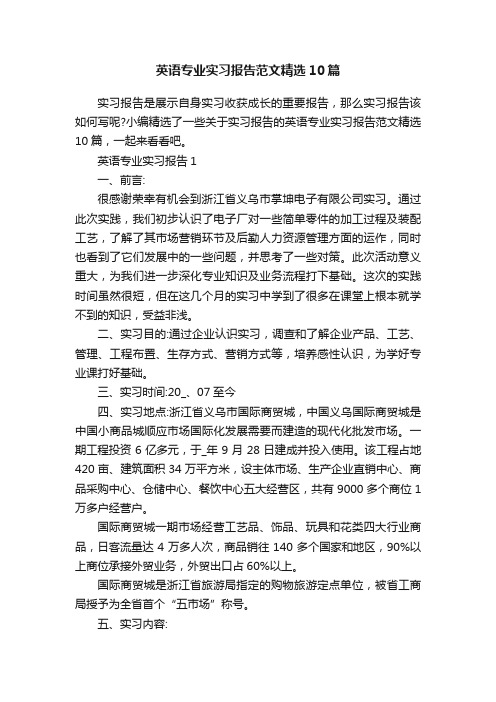
英语专业实习报告范文精选10篇实习报告是展示自身实习收获成长的重要报告,那么实习报告该如何写呢?小编精选了一些关于实习报告的英语专业实习报告范文精选10篇,一起来看看吧。
英语专业实习报告1一、前言:很感谢荣幸有机会到浙江省义乌市掌坤电子有限公司实习。
通过此次实践,我们初步认识了电子厂对一些简单零件的加工过程及装配工艺,了解了其市场营销环节及后勤人力资源管理方面的运作,同时也看到了它们发展中的一些问题,并思考了一些对策。
此次活动意义重大,为我们进一步深化专业知识及业务流程打下基础。
这次的实践时间虽然很短,但在这几个月的实习中学到了很多在课堂上根本就学不到的知识,受益非浅。
二、实习目的:通过企业认识实习,调查和了解企业产品、工艺、管理、工程布置、生存方式、营销方式等,培养感性认识,为学好专业课打好基础。
三、实习时间:20_、07至今四、实习地点:浙江省义乌市国际商贸城,中国义乌国际商贸城是中国小商品城顺应市场国际化发展需要而建造的现代化批发市场。
一期工程投资6亿多元,于_年9月28日建成并投入使用。
该工程占地420亩、建筑面积34万平方米,设主体市场、生产企业直销中心、商品采购中心、仓储中心、餐饮中心五大经营区,共有9000多个商位1万多户经营户。
国际商贸城一期市场经营工艺品、饰品、玩具和花类四大行业商品,日客流量达4万多人次,商品销往140多个国家和地区,90%以上商位承接外贸业务,外贸出口占60%以上。
国际商贸城是浙江省旅游局指定的购物旅游定点单位,被省工商局授予为全省首个“五市场”称号。
五、实习内容:一个偶然的机会我来到了浙江义乌有名的国际商贸城,应聘的工作跟我的实际专业并不对口,起初是对掌坤电子有限公司的基本情况进行了解,后来我从事的是电子商务,刚开始对业务都不熟悉,每天都是对着电脑跟客户聊天,让他们了解我们的产品,这时候就需要注意跟客户聊天时说话的语气,还考验了做生意的头脑,很多时候还要做对账单,所以工作起来很吃力,但是在老板和同事的关心和教导下我慢慢开窍了…因为这是一个国际化的商贸城,所以时常会有外国客户光顾,有美国的、韩国的、日本的、阿富汗的、非洲的…不得不说,来到这里我的英语口语也得到了很大的提高。
英语专业实习报告范文精选10篇

英语专业实习报告范文精选10篇实习生活又即将告一段落了,我们肯定学习到了不少学问,是时候写一篇实习报告好好总结一下了。
以下是小编整理了关于英语专业实习报告范文精选10篇,希望你喜欢。
英语专业实习报告范文1一、实习目的为了巩固大学期间所学到的英语专业知识。
提高实际操作技能。
丰富实际工作和社会经验。
掌握操作技能。
将所学知识运用于实际工作。
二、实习内容按照老师的安排。
我制定了相应的实习计划。
在这个公司里我的主要工作是总经理助理。
协助总经理做一些日常工作。
比如商业计划书的制定和一些文件资料的翻译等等。
三、实习心得体会一个月的实习。
让我学到了很多在书本上没学过的东西。
也让我对这个社会有了更多深入的了解。
我认为学我们这个专业或者说在做总经理助理这个工作时应当具备以下几种能力:(一)交际能力善于与他人交往是做这项工作应具备的首要能力。
说到底。
助理其实也是一种服务人员。
而服务人员就必须懂得如何与他人接触。
“他人”既包括外部的客户。
也包括内部的同事和领导。
我们必须要学会如何与他人建立和维持关系。
学会倾听别人的意见表达自己的想法。
注重交往艺术。
能够区别不同性别。
不同场合。
不同年龄。
不同文化背景的人应采取交往方式。
对自己一定要有正确的定位。
才能在工作中提供优质的服务。
(二)合作能力助理工作不像某些物质工作那样工序分明。
无论是在前台还是在后台的服务都必须与公司的上司、下属、同事、顾客、供应商等进行合作。
另外。
做一名助理还应当有全局观念。
较强的协调沟通意识。
学会与供应商协商。
与同事合作。
充分发挥不同角色的作用。
利用现有的各种因素为公司提供满意的服务。
发挥助理的中介、纽带作用。
(三)学习能力在我看来。
整个实习过程既是我向用人单位提供服务的过程。
也是一个学习的过程。
助理必须根据公司和客户的具体需要确立服务方式。
我们如果越了解他人的期望。
就越能为他人提供优质的服务。
而市场需求的不断变化就要求我们应有不断学习新知识、新技能的能力。
专业英语实习报告【三篇】

专业英语实习报告【三篇】专业英语实习报告【三篇】专业英语实习报告【一】在开始实习之前,我多少有些心虚。
因为我的许多朋友都有过假期打工的经历。
而作为一名英语专业的大二学生,这次的实习却是我的次工作经历。
我很担心自己会在工作的过程中出现差错。
但现在回想这实习的两个星期在工作和生活上出现的困难,其实都不算什么。
就像著名主持人鲁豫曾经说过的话,如果一个困难没有将你****,你一定会变的比以前更坚强。
我相信如果再有一次实习的机会,我一定会比这次做的更好。
在这里我要感谢学校安排了这次实习,也要感谢××公司给我这次机会,虽然只有短短的两个星期时间,但是我所学到的将使我受益一生。
因为这次实习的经历让我原本枯燥的暑假变的充实起来。
一、实习过程这次实习我主要负责的是办公室文秘的工作。
次走进办公室,一切都是那么陌生,所有的工作人员都各自忙着,仿佛没有人注意到我,这让我本来激动的心情多了一些慌乱。
这个时候我想起了在学校时老师对我我们说的一句话,人的适应能力是无穷的。
于是我深深的吸了一口气准备迎接接下来的一个个挑战。
后为了让我掌握发传真的方法她又交给我一份需要发的传真让我练习。
回到自己的座位上我一边体会着同事跟我说的话,一边发传真,当听到传真发送成功后的“嘟嘟”声,我便又小小地得意一番,虽然很傻,但至少又学会了一项办公器材的用法。
在这里我要特别感谢这位前辈,她不仅教给了我很多有用的东西,还把我介绍给其它的同事认识,以帮助我提高工作方面的能力。
慢慢的我也不在只是闷着头做,遇到疑难的问题就请教这些前辈们,我觉得自己开始融入这个集体了。
在做打字发传真等枯燥工作的时候,我不止一次的幻想着公司忽然有英文的文件需要翻译,在大家焦头烂额,手足无措的时候,我镇定的走出来然后利用在学校学到的知识解决这个棘手的问题。
但当幻想成为现实的时候,我却慌了阵脚。
因为文件涉及的化学产品,金属元素等专有名词我连读都有困难更不用说翻译了。
英语专业实习报告范本(五篇)

英语专业实习报告范本作为一名即将毕业踏入社会的大学生,这次实习就像是上台前的最后一次彩排,当我走进公司时那种激动而又紧张的心情不言而喻。
生怕会在工作中出现差错,然而现在看来所有在实习中出现的困难,都是一笔珍贵的财富,警示着我在今后的工作中做得更好。
一、实习过程开始实习之前,我多少有些心虚。
因为我的许多朋友都有过假期打工的经历。
而作为一名英语专业的学生,这次的实习却是我的第一次工作经历。
从工作那天开始,我过着与以往完全不一样的生活,每天在规定的时间上下班,上班期间要认真准时地完成自己的工作任务,不能草率敷衍了事,我们肩上扛着的责任,不再只是对自己了,而是对一个公司,所以凡是都要小心谨慎。
学校换成了公司,同学换成了同事,不再有自由支配的时间,一切来得那么无情,但是去必须适应。
其实我的工作就是、做些翻译、收发信函、报价、传真和邮件、绘制表格等。
每天重复着这些烦琐的工作,时间久了容易厌倦,但是工作烦琐也不能马虎,一个小小的错误不但会给自己带来麻烦,更会给公司带来巨大的损失,而像公司的业务员每天都得到处奔波,他们必须具备坚韧不拔的个性,遭遇挫折时绝不能就此放弃,犯错时遭到领导责骂还不能赌气就此辞职,每次看到他们我就会充满干劲。
踏上了社会我们开始与形形色色的人打交道,由于存在着利益关系,很多时刻同事不会像同学一样嘘寒问暖,有时候我会很矫情的想起安妮宝贝说过的,纯粹的东西总是死的很快,而现在所能做的,只有在怀念中适应变化的一切。
二、实习感悟“在大学里学的不是知识而是一种叫自学的能力。
”当我真正走上工作岗位时才深刻的体会到这句话的含义,除了英语和计算机操作外,课本上学的理论用的很少,我担任的助理一职平时做些接待客户、处理文件,有时觉得没有太多挑战性,而同公司的网站开发人员就大部一样了,计算机知识日新月异,他们不得不以自学尽快掌握新知识,迎接一个一个新的挑战,如果他们之靠在学校中学到的知识肯定是不行的。
我们必须工作中勤于动手,不断学习新知识积累经验,没有自学能力的人迟早会被企业和社会淘汰。
英语专业实习报告册范例
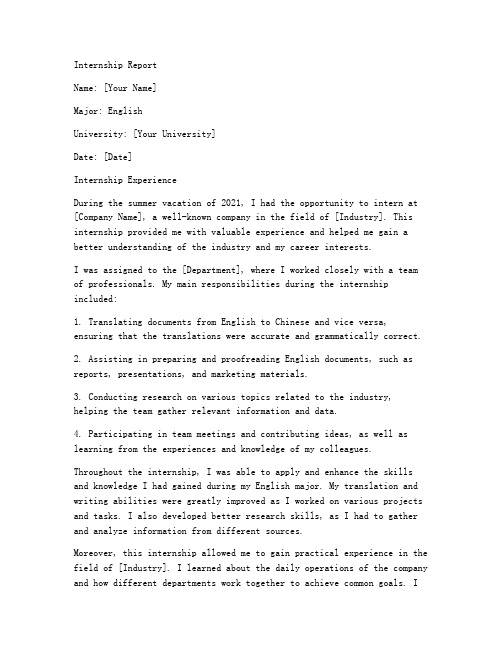
Internship ReportName: [Your Name]Major: EnglishUniversity: [Your University]Date: [Date]Internship ExperienceDuring the summer vacation of 2021, I had the opportunity to intern at [Company Name], a well-known company in the field of [Industry]. This internship provided me with valuable experience and helped me gain a better understanding of the industry and my career interests.I was assigned to the [Department], where I worked closely with a team of professionals. My main responsibilities during the internship included:1. Translating documents from English to Chinese and vice versa, ensuring that the translations were accurate and grammatically correct.2. Assisting in preparing and proofreading English documents, such as reports, presentations, and marketing materials.3. Conducting research on various topics related to the industry, helping the team gather relevant information and data.4. Participating in team meetings and contributing ideas, as well as learning from the experiences and knowledge of my colleagues.Throughout the internship, I was able to apply and enhance the skills and knowledge I had gained during my English major. My translation and writing abilities were greatly improved as I worked on various projects and tasks. I also developed better research skills, as I had to gather and analyze information from different sources.Moreover, this internship allowed me to gain practical experience in the field of [Industry]. I learned about the daily operations of the company and how different departments work together to achieve common goals. Ialso had the chance to observe and understand the challenges and opportunities faced by the industry.One of the most valuable aspects of this internship was the opportunity to work with a team of professionals. I learned a lot from their experiences and gained valuable insights into the industry. They were always willing to share their knowledge and guide me through the tasks at hand. I also had the chance to network with other interns and employees, expanding my professional network.ReflectionsThis internship was a great learning experience for me. I not only improved my English language skills but also gained a better understanding of the industry and my career interests. I realized the importance of hard work, teamwork, and continuous learning in the professional world.I would like to express my gratitude to [Company Name] for providing me with this valuable opportunity. I am confident that the skills and knowledge I gained during this internship will be beneficial in my future academic and professional pursuits.RecommendationsBased on my experience, I would recommend the following recommendations for future interns:1. Be proactive and willing to learn. As an intern, you may encounter new tasks and challenges, but being proactive and open to learning will help you grow and develop.2. Build strong relationships with your colleagues. Networking is an important aspect of any internship, as it can lead to future opportunities.3. Take advantage of the resources and opportunities provided by the company. Many companies offer training, workshops, and other resources that can help you gain more knowledge and skills.In conclusion, my internship at [Company Name] was a valuable experience that allowed me to apply and enhance my English major skills in a professional setting. I gained practical experience in the field of [Industry] and built strong relationships with professionals in the industry. I am grateful for this opportunity and believe that it will greatly benefit my future academic and professional pursuits.。
英语专业实习报告模板6篇

英语专业实习报告模板汇总6篇在现实生活中,大家逐渐认识到报告的重要性,报告具有成文事后性的特点。
那么你真正懂得怎么写好报告吗?以下是小编为大家整理的英语专业实习报告6篇,希望能够帮助到大家。
英语专业实习报告篇1一、实习目的巩固商务英语专业的专业知识,提高口语水平及实际操作技能,丰富实际工作和社会经验,掌握操作技能,将所学知识用于实际工作。
进一步培养自己的业务水平、与人相处的技巧、团队协作精神、待人处事的能力等,尤其是观察、分析和解决问题的实际工作能力,以便提高自己的实践能力和综合素质,希望能帮助自己以后更加顺利地融入社会,投入到自己的工作中。
认识了解自己平时学习的不足,找出自身状况与社会实际需要的差距,在以后的学习期间及时补充相关知识,为求职与正式工作做好充分的知识、能力准备,从而缩短从校园走向社会的心理适应期。
二、实习内容我制定了相应的实习计划,注重在实习阶段对所学的商务英语理论知识进行进一步的巩固和提高,同时锻炼自己的口语能力,以期达到根据理论知识,指导日常的工作实践的目的。
学习公司的企业文化、销售技巧、沟通技巧、团队协作精神、礼仪等各方面的知识,主要是强化自己的口语表达能力三、实习总结或体会实习对我来说是个既熟悉又陌生的字眼,因为它是大学生步入社会必经的一个过程,虽然自己在平时做过一些兼职工作,但真正进入公司工作还是第一次。
它全面检验我各方面的能力:学习、生活、心理、身体、思想等等。
就像是一块试金石,检验我能否将所学理论知识用到实践中去。
关系到我将来能否顺利的立足于这个充满挑战的社会,也是我建立信心的关键所在,所以,我对它的投入也是百分之百的!紧张的一个月的实习生活结束了,在这一个月里我还是有不少的收获。
实习结束后有必要好好总结一下。
在实习中我了解到商务英语的专业要求能够熟练应用外贸商务知识、英语口语,要有较好的翻译能力,能够回复一般商务信函,与外商进行沟通等。
实习期间公司的同事给予了我热情的指导和帮助,而我也虚心向他们请教学习,把大学所学的知识加以运用,在理论运用于实践的同时,也在实践中更加深刻地理解了以前没有理解透彻的知识。
英语专业实习报告(通用8篇)
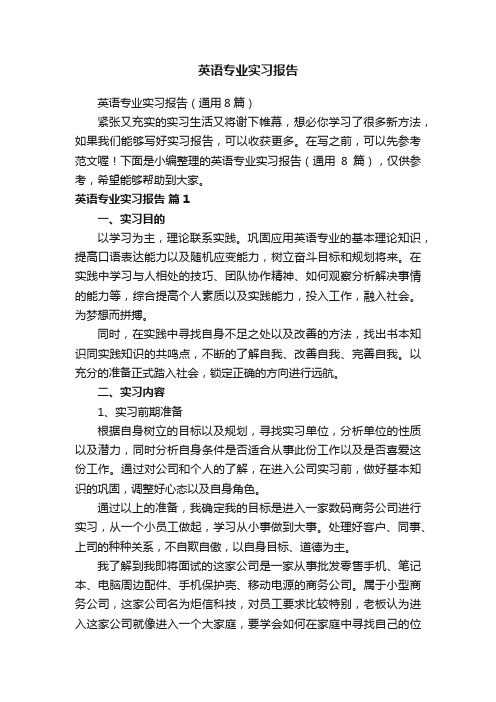
英语专业实习报告英语专业实习报告(通用8篇)紧张又充实的实习生活又将谢下帷幕,想必你学习了很多新方法,如果我们能够写好实习报告,可以收获更多。
在写之前,可以先参考范文喔!下面是小编整理的英语专业实习报告(通用8篇),仅供参考,希望能够帮助到大家。
英语专业实习报告篇1一、实习目的以学习为主,理论联系实践。
巩固应用英语专业的基本理论知识,提高口语表达能力以及随机应变能力,树立奋斗目标和规划将来。
在实践中学习与人相处的技巧、团队协作精神、如何观察分析解决事情的能力等,综合提高个人素质以及实践能力,投入工作,融入社会。
为梦想而拼搏。
同时,在实践中寻找自身不足之处以及改善的方法,找出书本知识同实践知识的共鸣点,不断的了解自我、改善自我、完善自我。
以充分的准备正式踏入社会,锁定正确的方向进行远航。
二、实习内容1、实习前期准备根据自身树立的目标以及规划,寻找实习单位,分析单位的性质以及潜力,同时分析自身条件是否适合从事此份工作以及是否喜爱这份工作。
通过对公司和个人的了解,在进入公司实习前,做好基本知识的巩固,调整好心态以及自身角色。
通过以上的准备,我确定我的目标是进入一家数码商务公司进行实习,从一个小员工做起,学习从小事做到大事。
处理好客户、同事、上司的种种关系,不自欺自傲,以自身目标、道德为主。
我了解到我即将面试的这家公司是一家从事批发零售手机、笔记本、电脑周边配件、手机保护壳、移动电源的商务公司。
属于小型商务公司,这家公司名为炬信科技,对员工要求比较特别,老板认为进入这家公司就像进入一个大家庭,要学会如何在家庭中寻找自己的位置以及价值。
价值不一定是金钱的利益,还有亲情、友情。
这也是我选择这家公司的重要点。
因为团结才能成功,因为有爱才有价值。
为了能顺利通过面试,进入这家公司,我也做了许多准备。
首先,在大致了解公司的基础上,我也不断的复习英语专业中比较实用以及基础的知识。
基础知识包括商务常用单词、句型的听写说,同时也加强自身的口语表达能力以及随机应变能力。
- 1、下载文档前请自行甄别文档内容的完整性,平台不提供额外的编辑、内容补充、找答案等附加服务。
- 2、"仅部分预览"的文档,不可在线预览部分如存在完整性等问题,可反馈申请退款(可完整预览的文档不适用该条件!)。
- 3、如文档侵犯您的权益,请联系客服反馈,我们会尽快为您处理(人工客服工作时间:9:00-18:30)。
英语专业实习手册范文2篇毕业实习是英语专业培养计划的重要组成部分,是提高学生就业能力的重要环节。
《实习手册》作为高校实践教学管理档案的重要组成部分,是英语专业学生整个实习过程的真实反映和重要凭证,本文是小编为大家整理的英语专业实习手册范文,仅供参考。
英语专业实习手册范文一:学部外语外贸学部专业:英语xx年x月x日目录1 校外分散教学实习要求一、校外分散教学的目的:为培养应用型人才,学院决定实施工学结合、校企合作的"3+0.5+0.5"办学模式,通过加强实践教学环节,提高学生实践能力,使学生在激烈的市场竞争中获得更好的就业机会。
通过生产和毕业实习,学生应该具有如下的经验与技能:熟练的口才演讲技能;会运用现代化办公手段;懂得法律法规;会观察和调查市场现状,发现存在的问题和机遇,分析原因,能运用所学知识找到解决问题的办法,能设计系统的解决方案。
为此,要求学生严格按照实习大纲的要求,在本实习指导手册的指导下,对提出的实习内容结合所在实习单位的岗位要求进行学习和锻炼,从而达到学以致用的目的。
二、校外分散教学的要求本生产实习指导手册提出的实习内容包含了从事市场营销职业要求的知识与技能,学生可以结合所在实习单位的岗位要求,灵活的有重点的选择其中某些实习内容进行学习和锻炼,完成指导老师布置的相关作业或课题,每月进行一次总结并写出1200-1500字的月小结汇报,第七学期实习结束后写出生产实习报告。
在实习期间,要求学生做到每周按时与指导老师进行联系,汇报实习的工作进展情况和思想状况。
2 校外分散教学实习主要内容2.1实习内容1 英语编译1目的毕业生在实习过程中能运用学到的翻译基本理论和技巧进行口笔译实践,了解编译的基本理论知识,分析和解决在翻译实践中遇到的实际问题。
2基本内容负责英语报刊或杂志的内容翻译与编辑,以及英语资料的整理,校对;在责任编辑指导下,编辑或撰写相应类别的资讯;协助处理读者来信;协助进行读者反馈信息的整理和数据统计工作;协助组稿工作,包括寻找合适的文章和图片;协助编辑工作,包括拟定标题、校对文稿、完成注释;协助排版后的文稿以及声音校对工作;协助校片;协助完成编读座谈活动,包括活动目的的确定、调查问卷的拟定、活动内容的记录以及总结报告的撰写等。
亦可参与英语网站的内容策划、收集、撰写和更新,负责一定的品牌推广工作。
3技能与培养目标培养学生具有一定的处理、编辑英文报刊文字的能力。
4完成的要求每月完成一份月实习总结,实习结束完成3000字左右的课程实习报告。
5完成的时间第七学期2.2 实习内容2 专业技术翻译1目的毕业生在实习过程中能运用学到的翻译基本理论和技巧进行翻译实践,熟悉不同领域的专业知识,使学生具备一定的专业技术翻译的能力。
2基本内容用翻译理论指导翻译实践,并自觉运用于翻译实践。
主要涉及市场调研、公司章程、合同协议、公司产品简介、企划方案等文件资料翻译;信函翻译,网页翻译,简历、申请、公证书的翻译;各行各业技术资料的翻译等。
3技能与培养目标培养学生多专业多领域的专业中英文互译,可进行笔译以及口译,公司企业文件资料等各方面的翻译能力。
4完成的要求每月完成一份月实习总结,实习结束完成3000字左右的课程实习报告。
5完成的时间第七学期2.3实习内容3 外事接待1目的对学生已学部份理论知识进行综合运用的培训,加强学生对社会的了解,培养和训练学生交际,接待的能力。
提高学生的口语表达能力,培养沟通能力。
2基本内容协助对外公共关系的建立与保持;协助接待企业、政府外事部门的外宾,日常陪同翻译,外事事务处理;参与外事活动;协助办理出国审批。
3技能与培养目标在实习过程中,运用英语来实现交际的目的,提高英语的交际能力。
培养学生在涉外交际中,了解并掌握对方的文化、风俗习惯,培养独立思考、独立工作的能力。
4完成的要求每月完成一份月实习总结,实习结束完成3000字左右的课程实习报告。
5完成的时间第八学期2.4 实习内容4 外贸洽谈1目的通过实习,能熟练运用商务口语和技巧,准确表达,进行商务洽谈,培养学生的综合商务能力。
2基本内容积极参与外贸各环节的实际操作,通过信函、电话、展会等机会与外国客户进行交流。
在实习期间,主动联系各公司,寻找参展机会,例如:广交会、深交易会、东莞交易会等等,在展会里参与外宾接待、产品介绍、报价议价、现场翻译等环节,把商务口语的知识充分运用到实际中去。
3技能与培养目标培养学生作为外贸业务工作者,能够对商务谈判基本的知识有一定了解,包括理论篇谈判理论和技巧,和实践篇谈判对话的操练,从而既扩展知识,又掌握跨文化沟通的技巧,帮助学生将商务知识和商务实践能力更好结合。
4完成的要求每月完成一份月实习总结,实习结束完成3000字左右的课程实习报告。
5完成的时间第七学期2.5 实习内容5 外贸写作1目的通过实习,学生把理论商务知识运用于实践,通过商务实践,提高学生的综合能力。
2基本内容在外贸公司中,操练外贸交易各个环节信函的运用,比如说:建立贸易关系,询盘,报盘,还盘,下达订单,签订合同,运输,保险以及付款等等。
3技能与培养目标通过对外贸易函电常用词汇、短语、术语,习语和习惯表达方式的操练,培养学生阅读、翻译和写作能力,使学生能用英语处理进出口业务往来函电,签订合同和制作单证,提高学生在外贸业务活动中正确地使用英语的能力,以及对外进行各项业务联系和通讯活动的能力。
4完成的要求每月完成一份月实习总结,实习结束完成3000字左右的课程实习报告。
5完成的时间第七学期2.6 实习内容6 涉外导游1目的通过实习得到全面的锻练,从经验、知识、心理和技术层面上,培养学生的调查、计划、组织、领导、指挥、沟通、激励、执行、控制的高级营销管理能力,做一个讲职业道德高尚,业务技能熟练,思维开阔,知法守法的高级营销调研管理人才。
2基本内容对定价目标进行描述和市场可行性进行分析;对竞争对手的价格体系进行分析和研究,并集中那里合理的价格体系;对定价策略作出市场化分析并不断改进。
3技能与培养目标了解产品的定价方法和过程,会写出分析报告;有熟练的人际关系沟通能力;会各种现代办公软件,会运用网络进行远程沟通办公;会制定产品定价目标,会编制定价计划,会控制和处理各种事务;掌握行业的产品价格行情;懂国家法律法规,具有较强的公文处理能力。
具有高级营销经理的素质与技能,重点培养市场经理和产品经理人才。
4完成的要求遵守实习单位纪律,记录现状,找到成因,提出解决方案,每月进行总结,写出科学合理的月小结报告,最后形成完整的生产实习报告。
重点掌握定价的影响因素,定价策略和定价方法。
2.7 实习内容7 涉外1目的通过实习,学生能够综合运用英语和知识,增强学生的综合能力。
2基本内容学生应不仅能熟练运用各类办公英语进行工作、交流,还能熟悉英语中各类应用文体的写作。
在行政事业单位、各类企业从事涉外工作及相关工作。
3技能与培养目标培养德、智、体、美、劳全面发展的,适应社会主义市场经济需要的,既具有过硬的涉外理论和技能,又具有扎实的英语、计算机能力的应用型、复合型、外向型高级专门人才。
4完成的要求每月完成一份月实习总结,实习结束完成3000字左右的课程实习报告。
5完成的时间第七学期2.8 实习内容8 涉外酒店管理1目的通过实习,使学生熟悉酒店管理基本知识,具备一定的酒店管理的能力。
2基本内容各级星级涉外旅游酒店的前厅部、餐饮部、客房部、康乐部、市场部、人力资源部、财务部等相关部门的管理和服务工作,还可以选择各旅游景区景点、各类旅行社、专职或兼职导游以及其他相关企事业单位工作。
3技能与培养目标培养德、智、体全面发展,具有现代星级酒店业经营管理理念,具备牢固专业管理理论知识和熟练职业技能,能够对酒店前厅部,客房部,餐饮部等主要业务部门的一线工作进行组织和现场管理应用型技术人才。
4完成的要求每月完成一份月实习总结,实习结束完成3000字左右的课程实习报告。
5完成的时间第七学期广东工业大学华立学院学生校外分散教学第七学期生产实习成绩鉴定资料学部:专业班级:学号:姓名:学院指导教师:企业指导教师:实习单位:二0 年月日生产实习鉴定材料说明1、本学期校外生产实习时间为20xx年9月1日—2014年1月中旬,教学周为20周,学分为20学分。
2、按照实习指导手册的要求,学生正式实习后结合工作实际,选择学习实习内容模块,并填写校外分散教学学生实习内容选题审批表(附表A)3、实习学生在生产实习期间,每月应根据实习工作书写工作月小结(附表B),并在月底前上交企业和学校的指导教师批阅。
4、在生产实习期间,要求实习学生每周至少和学校指导教师联系一次,汇报生产实习工作进展情况和思想状况。
5、在本学期生产实习结束前,要求书写完成生产实习报告(附表C)并在实习结束前上交企业和学校的指导教师批阅。
6、在本学期生产实习结束后,将填写完成的生产实习内容选题表、生产实习月小结、生产实习报告、生产实习成绩鉴定表(附表D),以纸质版的形式一并上交学校指导教师审阅。
有变更实习单位的,连同变更实习单位审批表一起上交指导教师。
7、请实习学生在xx年x月x日(学校放假前5天)前上交以上生产实习鉴定材料(附表ABCDE)。
英语专业实习手册范文二:1学生顶岗实习管理办法(试行)为贯彻落实教育部《关于全面提高高等职业教育教学质量的若干意见》(教高〔2006〕16号)等文件精神,全面推进工学结合人才培养模式改革,进一步加强和完善我校学生在顶岗实习期间的教学管理和学生管理,使其科学化、规范化和制度化。
特制定本管理办法。
第一章组织和实施第一条高职院校学生到用人单位参加顶岗实习,实习时间不少于半年,是《国务院关于大力发展职业教育的决定》中所规定的,也是学校教学计划的重要组成部分。
学校教学部门应在规定的学期内安排学生顶岗实习,招生就业处和学生管理部门做好协调配合,择优推荐。
实习一般安排在最后一学期。
第二条教务处全面负责学校顶岗实习工作。
招生就业处应积极开发省内、省外、国内、国外就业市场,通过网上公布、召开招聘会等多种形式,及时向学生推荐顶岗实习或就业单位,配合用人单位搞好双向选择工作。
第三条各教学系负责学生顶岗实习中的各项具体工作,主要职责是:(一)根据专业要求建设校外顶岗实训基地;联系实习单位,签订实习协议;负责与实习单位沟通协调。
根据协议,双方共同修改相应教学计划,并制定顶岗实习考核办法,报教务处备案。
(二)对学生进行顶岗实习动员和培训,帮助学生明确实习目的和任务,对学生进行安全教育,杜绝各种意外事故发生,并做好实习经费安排、指导教师确定等工作。
(三)加强实习过程的管理,检查实习的进展情况,处理各种突发事件。
(四)制定实习成绩的评定标准,做好学生实习成绩的评定,实习材料的整理、归档等工作。
